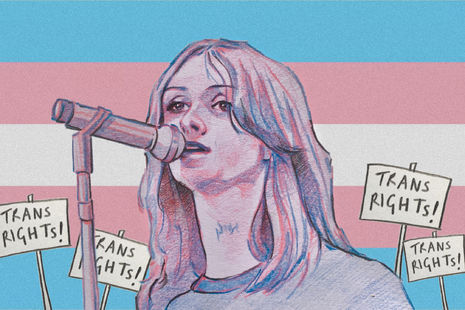In praise of a preacher’s daughter
Ethel Cain’s place as a prominent trans voice in popular culture is more crucial than ever writes Seun Ige

This Easter, as exams have been creeping in, I have found myself listening to a lot of Ethel Cain's latest release, Perverts. It functions like rhythmic white noise for me – the perfect accompaniment to my flashcard sessions. When I am knee-deep in my notes, I need something engaging enough to withstand the tedious task, without being so stimulating that I get distracted. So, Perverts offers a great middle ground, creating an exciting and haunting ambience, while not being overbearing.
As I have been spending time with Cain as my companion while revising, I have been thinking about her recent milestone. Earlier this April, the vinyl re-release of her debut 2022 record, Preacher’s Daughter, reached the Billboard top 10, selling 39,000 units between April 4 and April 10. She is the first openly trans person to enter this chart.
However, this has come at a particularly charged time. In the same week, the Supreme Court ruled that under the Equality Act 2010, for the purpose of single-sex services, ‘woman’ refers to biological sex, and not gender identity. It is a decision that amounts to little more than an attempt to police the bodies of a minority, under the guise of wanting to ‘clear things up’ for the safety of the majority. Far from offering clarity, the ruling marks a step back. It could legally justify excluding trans women from spaces where they are disproportionately vulnerable, and reinforces a system that places rigid definitions above lived realities. While claiming to care for the rights of women, governments have done little to address women's disempowerment. Cain's rise into the mainstream underscores a cultural divide: while legal systems tighten the definition of gender, pop culture is celebrating trans artists.
"Preacher's Daughter is a cautionary tale of when self-realisation comes too late"
Ethel Cain’s Preacher’s Daughter is a concept album with a moody Americana and Gothic sound. Its thirteen tracks chronicle a preacher's daughter grappling with faith, caught between the longing for belonging and the desperate need to escape her religious oppression. On tracks like ‘Hard Times’, Cain confronts the damage left by her father’s control, capturing the complexity that comes from surviving abuse from someone seen as a source of moral authority. She reflects on the lingering sense of confusion and shame that can follow survivors into adulthood. The emotional and thematic richness of the record lies in how Cain explores not only trauma, but what happens when you never truly confront and escape it. The preacher's daughter is not saved, but is instead consumed by the very world she desired to leave. It is a cautionary tale of when self-realisation comes too late.
Cain creates a world that feels both immersive and familiar, and this resonance is mirrored in the intensity of her fan base. Before I deleted TikTok to tackle the stack of flashcards mounting beside me, my ‘For You’ page was flooded with Ethel Cain ‘lore’ slideshows and videos, unpacking her character’s backstory. This side of the internet pieces together the lyrics and aesthetics of Cain into something living. As we are in an age where social media significantly contributes to young people's identity, it seems as though Ethel Cain has conjured up a mythic portal in which many of our generation have been subsumed.
"The parallel is striking: a trans artist is breaking barriers within the music world, at the exact moment judges tighten the legal definition of womanhood"
Cain’s cultural momentum runs counter to recent legal developments. The system has actively moved to exclude transgender women from certain sex-based protections. The parallel is striking: a trans artist is breaking barriers within the music world, at the exact moment judges tighten the legal definition of womanhood. This tension underlies why Cain’s presence in the mainstream is so significant. Her success does not erase the struggles of the trans people around me – those I love, and those I do not know. However, it does offer a counter narrative: one in which trans people, and their stories, have a place at the centre of public life, even if the Supreme Court and government refuse to recognise them.
 Comment / The (Dys)functions of student politics at Cambridge19 January 2026
Comment / The (Dys)functions of student politics at Cambridge19 January 2026 Arts / Exploring Cambridge’s modernist architecture20 January 2026
Arts / Exploring Cambridge’s modernist architecture20 January 2026 Features / Exploring Cambridge’s past, present, and future18 January 2026
Features / Exploring Cambridge’s past, present, and future18 January 2026 News / Local business in trademark battle with Uni over use of ‘Cambridge’17 January 2026
News / Local business in trademark battle with Uni over use of ‘Cambridge’17 January 2026 News / Your Party protesters rally against US action in Venezuela19 January 2026
News / Your Party protesters rally against US action in Venezuela19 January 2026









